How to Become a Cyber Security Analyst for Beginners
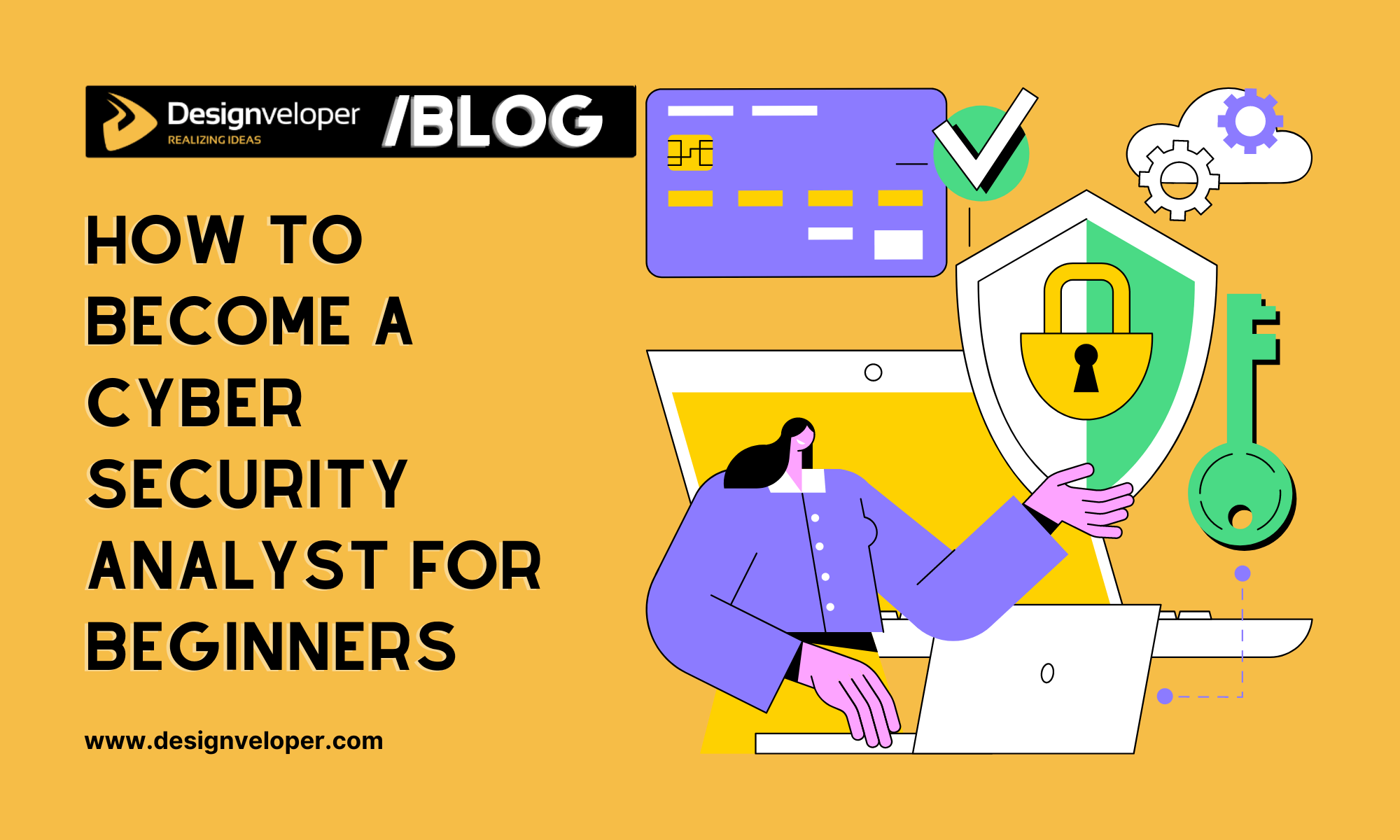
Have you ever dreamt of protecting the online world from black hackers? If yes, a cyber security analyst sounds like a suitable choice for you. Accordingly, you can always look for threats and keep your business with sensitive data safe. But where should you start on this cybersecurity career path? Today, our detailed article will give you everything you need to know, from the day-by-day tasks of an analyst to the steps you should take to land your first job in this in-demand field.
Understand Cyber Security Analysts
First, we’ll find out what a cyber security analyst does every day and whether this job is worth your time and effort investments.
Who is a Cyber Security Analyst?
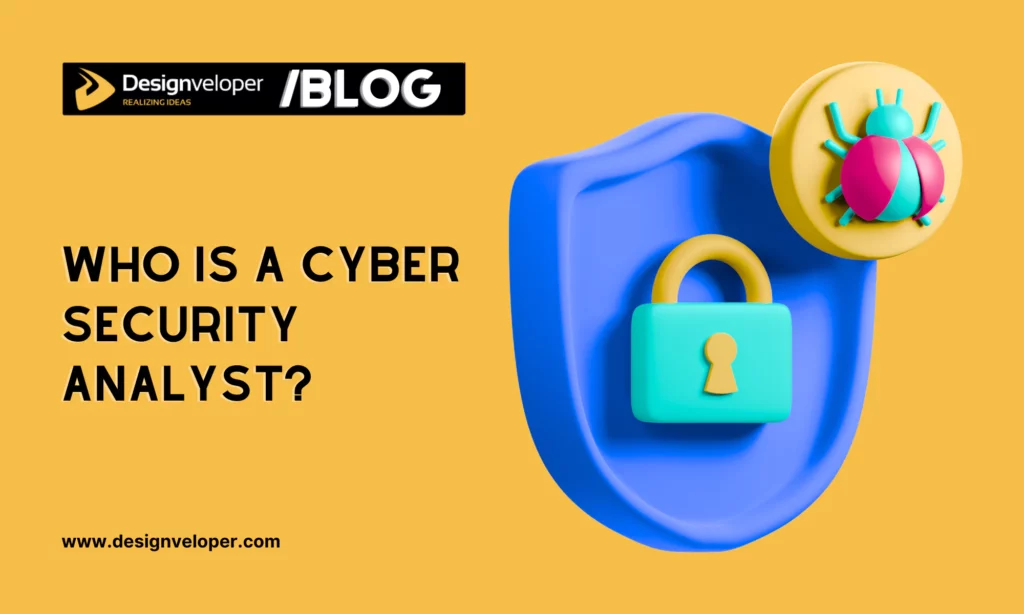
A cyber security analyst acts as a digital defender who safeguards an organization’s computer networks, systems, and data from unauthorized access and other cyber threats.
We all see that our personal information, financial records, and even critical infrastructure (e.g., power grids) depend heavily on tech and may be stored digitally. This can make them tempting targets for bad guys. That’s when cyber security analysts come in to discover vulnerabilities in our computer systems and implement security measures to prevent any harm.
For this reason, cyber security analysts can ensure the smooth operation of critical systems, safeguard sensitive information, and improve the organization’s overall security.
10 Types of Cybersecurity Analysts & Their Duties
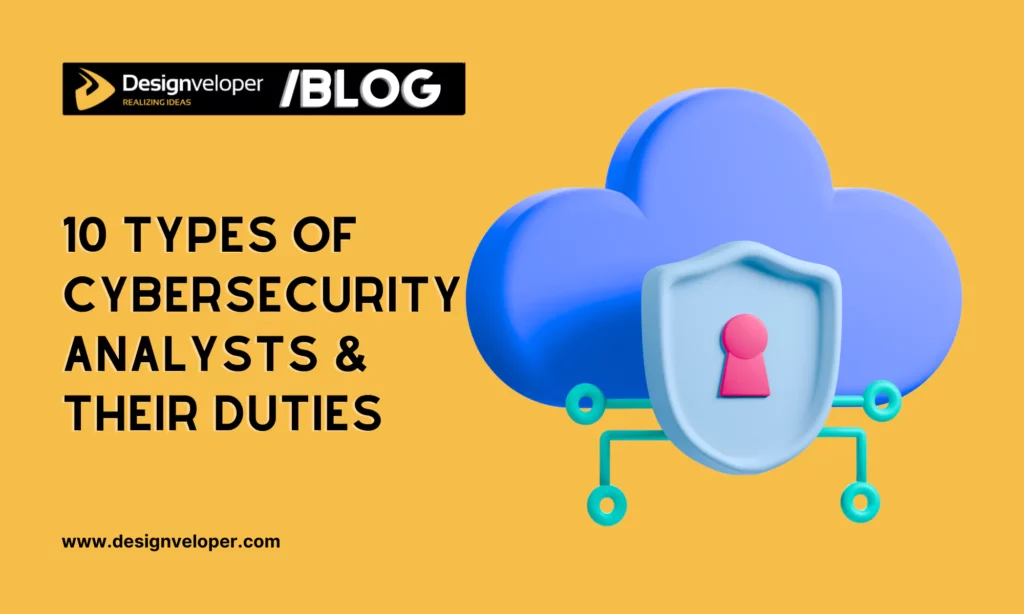
So, what do cyber security analysts do every day? Do their duties only revolve around finding and fixing vulnerabilities? The answers depend heavily on their area of expertise. Although all cybersecurity analysts work to protect a company’s digital assets and even physical devices, their specific duties can vary depending on their positions. Here are 10 common cybersecurity analyst positions and their key responsibilities:
1. Information Security Analyst (ISA)
An ISA is in charge of gathering and analyzing data to uncover your company’s security weaknesses. By collaborating with other security and IT experts, they can implement robust defenses, like firewalls, to safeguard sensitive information. They also evaluate how effective their security measures are and make proper adjustments to ensure a constantly evolving shield against cyber threats.
2. Security Operations Center (SOC) Analyst
SOC analysts are responsible for continuously monitoring and analyzing your company’s security posture. Their core duties involve proactively hunting for potential threats, investigating suspicious activities, and taking swift action to security incidents.
Further, these SOC analysts document their findings, including details of security incidents, the responses taken, and recommendations for future improvements. These reports keep everyone informed and guide strategic security decisions.
3. Security Consultant
Security consultants are cybersecurity strategists. They use their extensive knowledge and experience to assess your company’s current defenses. This helps them proactively identify potential vulnerabilities before threat actors carry out any attacks. Then, they can suggest security systems or solutions tailored to your company. This helps leaders in your company strengthen its security posture and reduce risks.
If you want to outsource cybersecurity consultancy, contact Designveloper. Here, we provide a wide range of security services, involving:
- Compliance and Regulatory Consulting: We assist your company in understanding and adhering to applicable regulations and industry standards such as HIPAA, PCI DSS, ISO/IEC 27001, etc.
- Security Architecture: We evaluate the security architecture of your company and provide suggestions for improvements.
- Secure Software Development: We embed security practices into the software development lifecycle.
5. Governance, Risk, and Compliance (GRC) Analyst
A GRC analyst is the bridge between the rules and regulations your business needs to follow (governance and compliance) and the ever-present risks in the digital world. Their main duty is to ensure your company works securely and within legal boundaries.
In particular, GRC analysts develop and maintain security policies that align with relevant industry standards and regulations. Further, they conduct or support internal audits to ensure your company follows these policies and regulations. They also help identify risks, work with other teams to devise mitigation strategies, and communicate complex security or compliance issues with stakeholders to keep them informed.
5. Penetration Tester (Pen Tester)
A penetration tester is technically a professional ethical hacker. They employ hacking tools and techniques to simulate cyber attacks on your company’s computer systems, networks, and applications. Through this cybercrime simulation, pen testers can detect vulnerabilities, evaluate security controls, and ultimately improve the overall security posture.
Normally, pen testers follow a structured methodology to conduct a cyberattack test. First, they define the target systems, the techniques to be used, and the limitations of the test. Then, they gather all information about the target systems and their vulnerabilities before carrying out exploitation to gain unauthorized access. Finally, they document the findings of the test, including the detected weaknesses and suggestions for remediation.
This is exactly what Designveloper does to help our clients test security posture. Accordingly, we conduct a wide range of testing procedures, including:
- Web Application Penetration Testing: We analyze web apps to discover security vulnerabilities.
- Mobile Application Penetration Testing: We evaluate mobile apps for potential security flaws.
- Network Penetration Testing: We identify weaknesses within your network infrastructure.
- Social Engineering Testing: We’ll assess the level of security awareness among staff members.
- Remediation Suggestions: We offer appropriate solutions to address identified weaknesses.
6. Forensic Analyst
A forensic analyst plays a crucial role in investigating security incidents after they occur. They then carefully collect digital evidence from potentially compromised systems (e.g., hard drives or network logs). Once collected, they will leverage specialized techniques and tools to examine the evidence. Through rigorous analysis, they can identify the attack’s source, the methods used, and the extent of the damage caused.
Forensic analysts also work closely with other security professionals during the incident response process. They offer crucial insights and evidence to help prevent the attack, recover after the damage, and minimize the possibility of future incidents.
7. Threat Intelligence Analyst
Threat intelligence analysts (TIAs) are considered a type of information security analysts. But they cover a more specific area – researching and analyzing potential cyber threats that will affect your company. Today, TIAs primarily use intuitive or experience-based judgment (nearly 50%) for cyber threat intelligence (CTI) analysis.
Further, they evaluate the severity of each attack. They also build threat models to detect possible attack scenarios, the actors behind them, and their motivations. All these things will empower your company to make informed decisions about cybersecurity. Understanding the importance of CTI, more than half of organizations build their own dedicated CTI teams in 2023.
8. Cloud Security Engineer
With advancements in techs (e.g., AI), threat actors can invade anywhere, be it on-premises devices or cloud platforms. According to the 2024 Global Threat Report by CrowdStrike, the number of cloud intrusion cases rose by surprisingly 75% from 2022 to 2023. Therefore, cloud security engineers play a vital role in protecting your assets on the cloud.
These engineers monitor the cloud environment for suspicious behaviors and security incidents. They also ensure your company complies with data security/privacy regulations and take quick responses to incidents. Further, they can be responsible for designing a secure cloud architecture, adopting security controls, and managing vulnerabilities.
9. Cybersecurity Architect
A cybersecurity architect takes responsibility for designing and executing your company’s overall cybersecurity strategy. This ensures a comprehensive defense against cyber threats. For this importance, in 2023, 42% of organizations had a security architect in charge of securing their business-critical software and tools.
Their core duties lie in crafting a secure architecture to protect your company’s systems and data. Moreover, they conduct risk assessments and devise security policies. They also monitor security implementation to ensure your company’s security posture aligns with relevant industry standards and government regulations
10. Network Security Analyst
Network security analysts are in charge of managing, analyzing, and securing your company’s network. Accordingly, they often do some research on cybersecurity protocols to detect weaknesses in hardware equipment, software programs, and any resources with a wireless connection. They also install protective programs (e.g., firewalls) and suggest other ways to reduce potential risks based on your needs.
Further, they design programs and implement policies to educate employees on safeguarding company data from daily online threats. They also monitor network activity to discover any potential harm and act quickly to handle these cyber threats.
Salary & Job Outlook for Cybersecurity Analysts
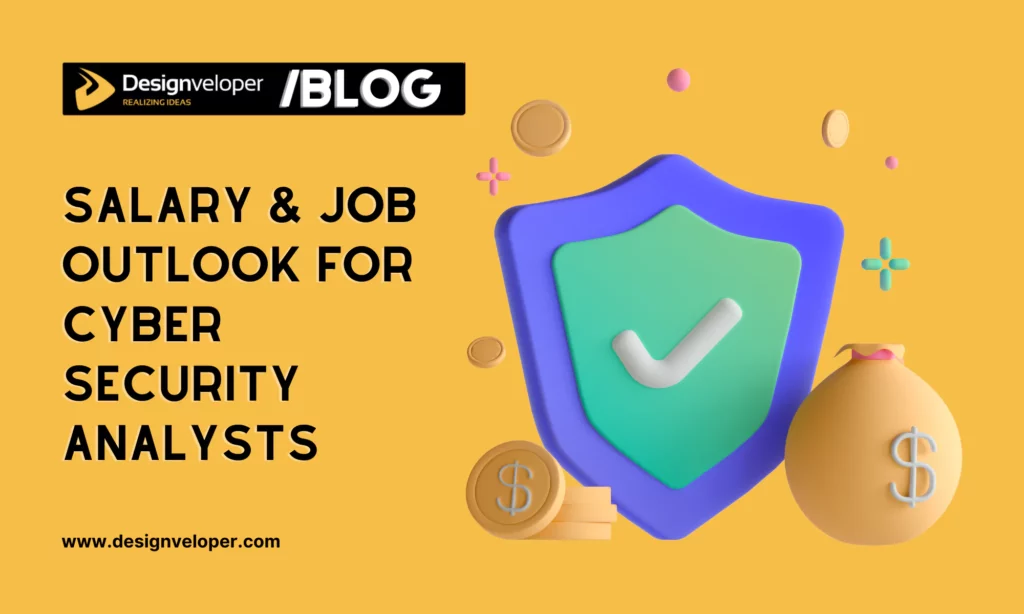
With all the great things cybersecurity brings to our digital world, its relevant jobs become more demanding and tempting with a rewarding paycheck.
According to Glassdoor, the average compensation for cyber security analysts is $139,497 per year, with a salary of $104,742 and additional pay (e.g., bonus or profits sharing). Plus, Manufacturing is considered the top-paying industry for this job in the US with a median pay of $121,877, followed by Pharmaceutical & Biotech ($118,99) and Energy, Mining & Utilities ($117,275).
For information security analysts, the U.S. Bureau of Labor projects a growth rate of 32% from 2022 to 2032. This growth is considered much faster than the average for all occupations. Further, a medium annual pay for this career reaches $120,360 with around 16,800 job openings each year.
This also goes with an increase in the global cybersecurity revenue, from $185.70 billion to $271.90 billion in 2029. Also, the United States generates the most revenue of over $81 million in 2024.
How to Become a Cybersecurity Analyst
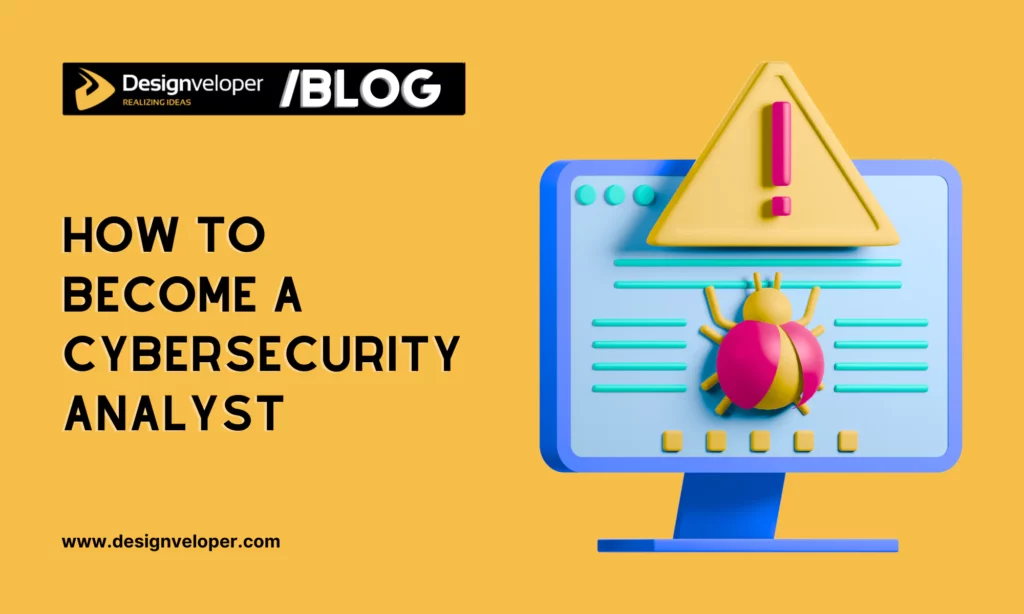
So, if you want to pursue this cybersecurity career path, what should you do? This section will be a decent guide for beginners to embark on this journey. From skills to certifications, everything will be covered through the following questions.
Question 1: What hard skills do I need to become a cybersecurity analyst?
As we already explained, cyber security analysts are the guardians of an organization’s data, computer systems, and networks. Therefore, a strong foundation in security concepts is crucial. This includes:
- Networking Fundamentals: It’s crucial for you to understand network protocols (TCP/IP), network devices (firewalls, switches, and routers), and network topologies.
- Operating Systems: You should understand how major operating systems (macOS, Windows, and Linux) operate and their potential vulnerabilities.
- Vulnerability Management: You need to understand how to identify, evaluate, and prioritize vulnerabilities in systems. This is essential to develop proactive security measures.
- Threat Knowledge: Understanding different types of cyber threats is beneficial. This allows you to identify and address these threats more effectively.
- Basic Scripting & Cryptography: You should comprehend scripting languages like Python or PowerShell. These languages can automate your tasks and improve security analysis. Further, having a basic understanding of encryption and decryption techniques is a plus.
- Security Tools: These are important to help you detect and respond to cybercrime effectively. So, you should understand core security tools like firewalls, intrusion detection/prevention systems, etc.
Further, each company will have specific requirements for a junior cyber security analyst or specific positions (e.g., SOC analysts). Therefore, you can look through the job market to understand what recruiters want from a candidate. Here’s a typical job announcement on LinkedIn:
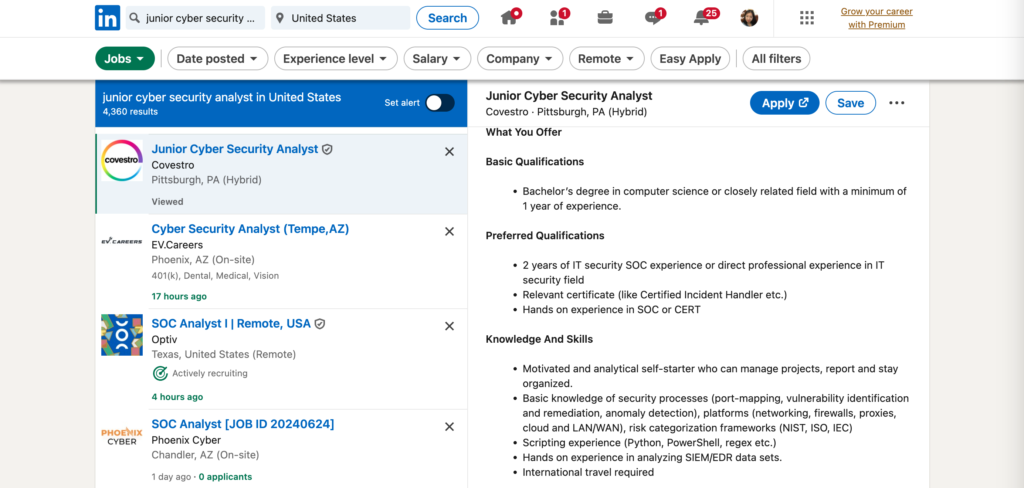
Question 2: Do I need a bachelor’s degree in cybersecurity analysis?
The answer is no. You don’t need a bachelor’s degree to start your cybersecurity analysis journey. When looking around third-party recruiting websites like Glassdoor, Indeed, and LinkedIn, we still see some companies only require a High School Diploma as below:
However, simple requirements mean simple responsibilities. These duties can be maintaining compliance with the US government security revolutions or handling some security problems in software programs.
Inevitably, owning a college or bachelor’s degree is still a plus. Further, companies encourage you to have additional yet relevant certifications (like CompTIA Security+, Certified Ethical Hacker, or Certified Incident Handler) to showcase your knowledge and commitment to the field. Acquiring experience in security processes, platforms, or risk categorization frameworks gives you an edge to win a position.
So if you want to stand out in this recruiting game, prepare everything to improve your resume and showcase you’re a perfect candidate.
Question 3: Are soft skills important for cybersecurity analysts?
The answer is yes. Cybersecurity isn’t just about technical work. And being a cyber security analyst doesn’t translate to working with only technology and computer systems all day.
In so many positions we mentioned above, cyber security analysts need to work with other teams from IT or management. They need to explain what security issues these departments can often face and collaboratively develop suitable security measures. Further, they can ensure the whole company can work in compliance with security policies. This is where soft skills are truly crucial for analysts.
These skills are clearly required in job requirements. Critical thinking, problem-solving skills, and a careful eye for detail are necessary to analyze security threats and detect vulnerabilities. In addition, you can hone communication and collaboration skills to work with other teams efficiently and productively.
Question 4: Where should I start as a beginner?
Do you want to become an information security analyst or a SOC? And how do you acquire all the technical expertise, soft skills, and certifications needed? If you’re a newcomer to this field and don’t know which cybersecurity roles to pursue, we advise you to acquire a robust cybersecurity foundation first.
Accordingly, you can explore free online resources like tutorials, knowledge bases, or articles from reputable security organizations (e.g., SANS Institute, National Institute of Standards and Technology, etc.). But for those without coding backgrounds, we encourage you to take online courses, bootcamps, or community college classes to get some foundational certifications (e.g., CompTIA Security+ or Certified Ethical Hacker). These cover basic knowledge, provide certifications, and may require some fees.
Here are some suggestions for you:
- Microsoft Security Analyst Course: This 6-month course offers you a flexible schedule. It covers basics about operating systems, networking, threat vectors, and more. Further, it helps you hone practical skills through a capstone project and prepare for the Microsoft SC-900 exam.
- IBM Cybersecurity Analyst Course: This course allows you a flexible schedule of 4 months. Its curriculum includes fundamental knowledge about operating systems, network security, cybersecurity tools, etc. This course also provides you with a capstone project and a quiz to review your understanding.
- Springboard – Cybersecurity Bootcamp: This 6-month bootcamp provides one-on-one mentorship and career coaching. It covers 17 cybersecurity topics, one capstone project, career support, and CompTIA Security+ exam preps. One plus of this bootcamp is its job guarantee after completion.
As you gain experience, you may acquire more advanced certifications. These certifications cater to specific areas within cybersecurity. So, research options that fit your interests and career path, like Certified Information Systems Security Professional (CISSP) for information security analysts or Certified Information Systems Auditor (CISA) for security audits.
Question 5: How do I get practical experience?
“Practice makes perfect.” This sentence is never wrong in any industry, including cybersecurity. Further, earning practical experience in this sector is a plus in grabbing a potential recruiter’s attention to your profile. There are many ways to acquire such experience.
- Internships: Internships provide valuable hands-on experience in real-world cybersecurity. Apart from practical skills, you can build your network and understand the daily tasks of a cybersecurity analyst.
- Entry-Level IT Roles: If you already work in a related IT field, transitioning into cybersecurity becomes much easier. You can find entry-level IT support analysts or network administrator roles. These positions can offer a strong foundation in IT infrastructure and network management. This then gives you valuable knowledge for aspiring cyber security analysts.
Designveloper’s Professional Advice

You’ve learned everything about cyber security analysts, from the top 10 job roles to essential preps to give you an edge in the job market. Yet, becoming a cyber security analyst is an ongoing process. Continuous learning is a vital factor that helps you advance in this dynamic field.
As cyber threats are becoming increasingly complex, staying updated on the latest trends and cybersecurity solutions is a must to help you unlock new job opportunities and climb the ladder in cybersecurity. You, accordingly, can stay informed with industry publications and blogs like The Hacker News, Unsupervised Learning by Daniel Miessler, or Security Weekly.
Further, companies like Designveloper offer you a chance to improve a cyber security analyst’s expertise through online courses or workshops. By constantly getting new skills and practical experience, you’ll be well-positioned to secure a rewarding career as a cyber security analyst.

















































